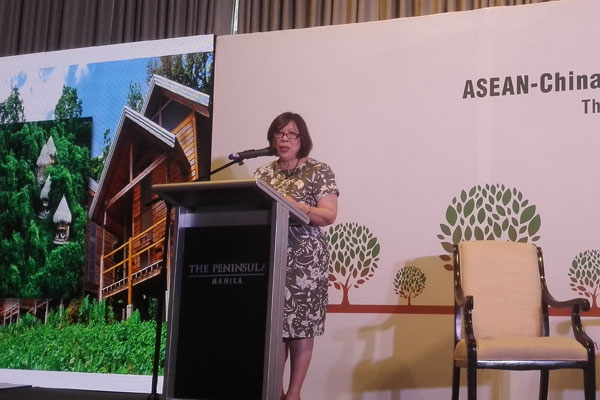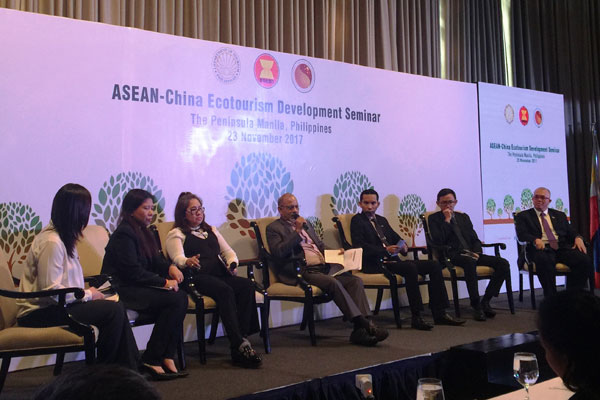
On 23 November 2017, ASEAN-China Ecotourism Development Seminar received strong support from the ASEAN Secretariat and ASEAN National Tourism Organizations, which attracted representatives from six ASEAN countries. The representatives presented excellent speeches and had in-depth discussions on “Ecotourism Development and Sustainable Growth” and “Best Practices and Policies on Ecotourism Development “
In the first session, Ms. Alma Rita R. Jimenez, Undersecretary of Philippine Department of Tourism delivered keynote speech. She elaborated on the significant relations between tourism development and environmental protection, the importance of ecotourism development and the challenges it faces, and put forward corresponding suggestions accordingly. She said that the fundamental basis for the development of tourism is natural resources. The relations between the two factors should be continuously mutually reinforcing. However, at present, the development of traditional tourism has brought a series of ecological problems. She suggested that both National Tourism Departments and tourism industries should work closely together to further explore the connotation of environmental resources and culture, jointly promote the development of ecotourism, minimize the impact of tourism development on the environment, and achieve win-win results.

In the second session, the speakers from National Tourism Organizations of Brunei, Indonesia, Malaysia, Myanmar, the Philippines and Thailand mainly shared and discussed in relevant important areas.
Mr. Danesta Nugroho from Ministry of Tourism of Indonesia made a brief introduction on Indonesia Sustainable Tourism Policy. He said that Indonesia has adopted environmental approaches on developing sustainable tourism destination, sustainable tourism observatory and sustainable tourism certification aimed at supporting environmental tourism development with sustainability. He further emphasized that, while implementing the policy and strategy, the huge investment in the key projects from the community is also crucial.
Dr. Jiraporn Prommaha from the Ministry of Tourism and Sports of Thailand highlighted the important spirit of sustainable tourism to keep balance between enjoying the exquisite experiences of the destinations and respecting the culture and nature.
Ms. Rebecca V. Labor from DoT, shared views on the importance of shared responsibility of the tourists and the local communities. She further explained the significance of taking consideration of carrying capacity at the ecotourism destinations so as to ensure substantial economic benefit being shared equally within the community.
Mr. Win Tin from Myanmar Tourism Federation said that Myanmar has adopted the Ecotourism Policy in line with Ecotourism Master Plan, established ecotourism pilot sites and developed community-based ecotourism projects. All these projects are put into implementation in accordance with the ecotourism policy.
Mr. Khairolnizam Saad from the Ministry of Tourism and Culture of Malaysia said that tourism industry regarded as a big business contributes significantly to the economic growth. Based on current studies, The number of tourists visited the natural and ecotourism sites has accounted for more than 30% in Malaysia. He emphasized that Malaysia has taken the lead to develop the ecotourism plan, to provide clear guideline for the sustainable tourism development. Various important measures have been addressed in the plan such as the eco-friendly investment, maintenance of the ecotourism sites, enhance synergy among ecotourism, encouraging partnership between local communities and stakeholders, marketing, effectiveness or attractiveness of the ecotourism products, developing ecotourism according to cluster.
Mr. Jeffrey Sunny Lai from the Ministry of Primary Resources and Tourism of Brunei said that Brunei has formulated Policy and the Forestry Act and put into force to protect the nature, particularly the forest and parks. Properly planning and choosing the right area for ecotourism development has been conducted to ensure best practices to be implemented with environmental friendliness.
The ASEAN National Tourism Organizations have strived and put forward key national policies and strategies as well as strategic directions aimed to protect, conserve and preserve the ecotourism sites so as to achieve the sound development of sustainable tourism development. The representatives from ASEAN National Tourism Organizations made comprehensive and constructive views and suggestions on how to strengthen sustainable tourism development and enhance tourism cooperation along the Belt and Road.